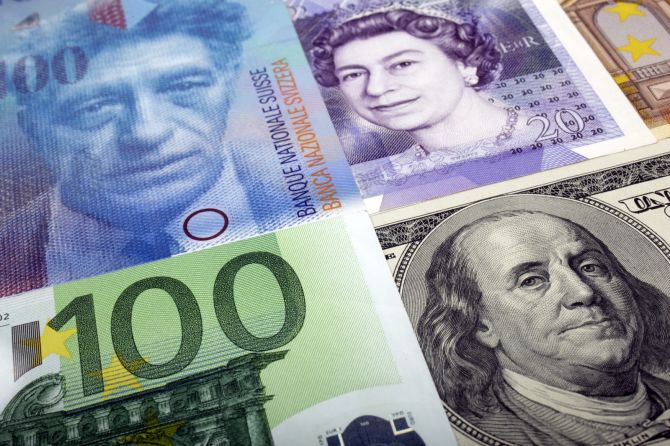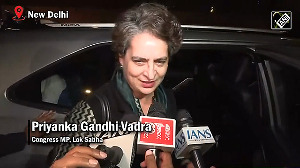Transaction costs continue to remain high, and India's performance in major indices measuring trade facilitation and efficiency of cross-border movement of goods is still dismal, says Jayanta Dey.
 With its overhang of poor people and inequitable income distribution, India needs to be on a sustained near-double digit growth path, which, given the performance in the post-1991 reforms (2003-2007), looked possible.
With its overhang of poor people and inequitable income distribution, India needs to be on a sustained near-double digit growth path, which, given the performance in the post-1991 reforms (2003-2007), looked possible.
However, UPA did not follow up on the next-generation trade reforms and allowed the growth rate to dip to five per cent and below. It paid a heavy price for it in the last elections.
The BJP won the elections with a clear mandate. PM Narendra Modi immediately outlined in his policy pronouncements that India needs - and is capable of sustaining - a high growth rate to create jobs and become a major global player.
Fuller integration into the global economy was recognised and incorporated in his flagship 'Make in India' campaign.
He made successful trips to all important countries and paved the way for far greater trade and investment collaboration than ever before.
Unfortunately, we have not yet moved from slogans to policy, and we have not at all translated the gains from the PM's visits into positive impact on our trade.
The low balance of payments deficit is just the result of a drastic fall in oil, gold and other commodity prices.
High growth in India has always been associated with high export growth. Subsequent to the 1991 reforms we benefitted both from our major trade reforms and the upswing in the global economy.
The picture is different today.
The world economy is just creeping along, and there is a distinct slowdown in global trade growth. But for us there is no option but to focus on a quick revival of the export momentum.
Unfortunately, it is not on the radar of the government, industry associations and economists. Encouraged by a downturn in the Chinese economy, pundits are writing about how India will be a growth engine in Asia, replacing China, forgetting that China's growth miracle was the result of high export growth.
Let us at least focus on that and not worry about overtaking China as the Asian leader. Ours is a $2 trillion economy as against China's $11 trillion economy which has far fewer poor people, and many more jobs in factories.
Even today, both economies are growing at the same rate of seven per cent. Let us just focus on reviving growth of exports of goods and services by fully implementing the next-generation trade reforms.
I thought the PM's 'Make in India' was a reflection of that. But I notice we are turning protectionist by raising duties on steel because we can't compete with China. India leads the pack of countries in anti-dumping initiations with 740 cases during 1995-2014 (218 in China).
Yes, we need infant industry protection, but our infants are 68 years old! If we want to be a major global player then we need to conform to the highest standards of global trade policy and not seek concessions.
Competitiveness embraces both national and global competitiveness. We can't ignore the latter. Trade facilitation needs top priority. India is crippled by massive trade transaction costs. Paper work and signatures required to undertake trade defy all logic.
As a result, cargo dwell time is one of the highest in the world. What takes days at Indian ports and airports takes just a few hours in successful trading countries.
Transaction costs continue to remain high, and India's performance in major indices measuring trade facilitation and efficiency of cross-border movement of goods is still dismal.
World Bank's Doing Business Indicators ranks India (out of 189) at 132 for trading across borders.
Needless to say, most of our competitors are ranked ahead of India. India is behind its competitors also in Logistics Performance Index.
The key recommendations that should be on the immediate agenda of the government are: To rely on a system based on trust with reliance on self-certification of importers, ex-post audits and minimal physical inspection.
Introduce full automation, leading to a paperless system with minimum face-to-face contacts and signatures. Unfortunately in India, the mindset is still geared towards a paper-based system with numerous face-to-face contacts.
It is a pity that with our software capabilities we have not yet moved to a fully electronic system.
We need to have a paperless system of cargo clearance by the next Budget. Reduce cargo dwell time to levels comparable to the best performers in South-East Asia within three years.
Most importantly, quarterly monitoring of cargo dwell time in major ports and airports by an Inter-Ministerial Trade Facilitation Committee (IMTFC) with the full attention of the prime minister, and chaired by him.
This committee does not work in most countries since these are not headed by the head of state.
The finance minister is overly biased in favour of revenue maximisation, while the trade facilitation champion, the commerce minister in most countries, is far less powerful than the finance minister.
An IMTFC headed by the PM needs to be set up with a clear terms of reference and announced in the next Budget.
Move towards a comprehensive single-window system that not only integrates customs with allied agencies and the DGFT, but with excise as well.
This single-window needs to run on a single operating platform, and be maintained by a single service provider, and not be a message exchange system between different operating environments.
What I find most puzzling is that an NDA government with a full majority is not paying sufficient attention to trade facilitation reforms when these were initiated by the previous NDA government, and even highlighted by Jaswant Singh in the last Budget speech of the Vajpayee government. My request to the PM is to immediately set up an IMTFC chaired by him, which will ensure that administrative procedures are streamlined, EDI is fully implemented with no paper trails and minimum face-to-face contacts, and that cargo dwell time in major ports and airports soon matches that of our competitors.
Most importantly, minimum face-to-face contacts will also count as a concrete anti-corruption initiative.
Jayanta Dey is a former economic advisor in the commerce ministry.










